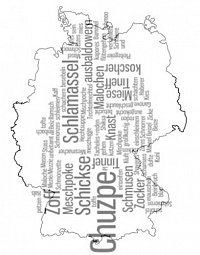Deutsche Übersetzungen zeitgenössischer israelischer Prosa, 1989-2019

Übersicht
- Deutsche Übersetzungen zeitgenössischer israelischer Prosa, 1989-2019
Projektleitung: Dr. Tom Kellner - Translating Israeliness:
German Translations of Contemporary Israeli Prose from 1989 to 2019 - Tagung: Literary Cross-Cultural Relations between Israel and Germany 1918-2022. 31 May -- 2 June 2022, University of Basel
- Workshop, 1-2 July 2021
- Cultural Encounters: Contemporary German and Israeli Literature
Reception, Translation and World Literature
Martin-Luther-Universität Halle-Wittenberg, 1-2 July, 2021
Deutsche Übersetzungen zeitgenössischer israelischer Prosa, 1989-2019
Projektleitung: Dr. Tom Kellner
Das von der Fritz Thyssen Stiftung geförderte Post-Doc Projekt untersucht deutsche Übersetzungen zeitgenössischer israelischer Prosa aus den letzten drei Jahrzehnten sowie deren öffentliche und kritische Rezeption. Es versucht zu ergründen, inwiefern die Auswahl der zu übersetzenden Werke in einem Zusammenhang mit deren Position im israelischen Literaturkanon stand, und fragt, ob ihre Rezeption in Deutschland ähnlich oder eher unabhängig von derjenigen in Israel ist. Dabei sind Fragen der Rezeption und Kanonbildung mit Fragen der Nationenbildung und des nationalen Imaginären verknüpft: Welche Attribute werden der Vorstellung von »Israelität« in den Übersetzungen (explizit oder implizit) zugeschrieben? Und wie wird das evozierte Bild wiederum in Deutschland rezipiert?
Diese Untersuchungen gehen aus der hitzigen Debatte um »Weltliteratur« als kulturelles Phänomen und als Disziplin im Bereich der Komparatistik hervor. Laut Kritiker*innen wie beispielsweise David Damrosch ist Weltliteratur jene Literatur, die über ihre Ausgangssprache und -nationalität hinausgeht, Grenzen und Begrenzungen transzendiert sowie ›universale‹ Anerkennung erfährt. Einige Wissenschaftler*innen haben das Konzept auf Grund der Unübersetzbarkeit von Texten aus verschiedenen Sprachtraditionen kritisiert oder gänzlich abgelehnt, während andere es auf eine Kritik am »linguistischen Imperialismus« und am globalen Englisch, oder auf die Ablehnung des »triumphalistischen Diskurses der Globalisierung« stützen.
Jüdische Literatur – die allgemein definiert werden könnte als die gesamte Literatur jüdischer Autor*innen, unabhängig von ihrer Nationalität – bietet sich als ein gutes Beispiel für das an, was Damrosch und andere als „Weltliteratur“ bezeichnet haben, da sie das Nationale scheinbar transzendiert und weithin in verschiedene Sprachen übersetzt ist. Gleichzeitig ist ein Großteil der zeitgenössischen jüdischen Literatur in israelischem Hebräisch geschrieben, welches die Nationalsprache der israelischen Juden* ist. Hebräische Literatur wurde allerdings explizit als Nationalliteratur konzipiert und sogar als essentiell für die Konsolidierung der israelischen Nation betrachtet. So oszilliert die israelische Literatur, die im Mittelpunkt des Projekts steht, stetig zwischen National- und Weltliteratur und offenbart dabei die Spannungen zwischen den beiden Konzepten.
Translating Israeliness:
German Translations of Contemporary Israeli Prose from 1989 to 2019
This research project, funded by Fritz Thyssen Stiftung , examines German translations of contemporary Israeli prose written in the years 1989-2019. This comparative project engages with the theoretical framework of world literature, postcolonial theory and the notion of translatability, and offers a pioneering comprehensive examination of contemporary Israeli-German translations through a historical perspective. This comparative research considers the various historical and cultural components that affect in turn the reception of these translated works, while focusing on the changes undergone by the notion and representations of Israeliness within the process of translation, as well as the diversity of its reception. Hence, through a close and comparative reading of source and translation, the project aims to highlight the different ways in which Israeliness is represented and translated into the German.
These inquiries emanate from the heated debate over “World Literature” as a cultural phenomenon and as a discipline in the field of comparative literature. World literature, according to comparativists such as David Damrosch, is a literature that goes beyond its source language and nationality, transcends borders and boundaries, and achieves “universal” recognition. Some scholars have criticized or rejected altogether this concept on the grounds of the untranslatability of texts from various linguistic traditions. Others base it on a critique of “linguistic imperialism” and global English, or on the rejection of the “triumphalist discourse of globalization”.
Thus, through the theoretical framework of world literature, I wish to investigate the reception of translated Israeli literature as European “world literature” within the German speaking world, while still considering the obstacles and challenges that prevail in its path as a cross-cultural translation, representing specific national attributes, i.e., Israeliness.
Tagung: Literary Cross-Cultural Relations between Israel and Germany 1918-2022. 31 May -- 2 June 2022, University of Basel
Workshop, 1-2 July 2021
Cultural Encounters: Contemporary German and Israeli Literature
Reception, Translation and World Literature
Martin-Luther-Universität Halle-Wittenberg, 1-2 July, 2021
Thursday, July 1st 2021
9.00-9.15 Gathering and Opening Remarks
9.15-10.45 Panel 1
Judith Müller (University of Basel/Ben-Gurion University of the Negev)
Sifrut HaAvot and Weltliteratur: Reading Gershon Shofman Today
Yemima Hadad (Universität Potsdam)
Vaterland vs. Eretz HaAvot: Martin Buber on One Land and Two Peoples
10.45-11.15 Coffee Break
11.15-12.45 Panel 2
Fabian Sader (Europa-Universität Viadrina)
Tomer Gardi’s Broken German – A Radical Manifestation of Deleuze’s and
Guattari‘s Minor Literature?
Tomer Gardi (Ben Gurion University of the Negev)
How We Are Translated
12.45-14.00 Lunch Break
14.00-15.00 Text Discussion 1
15.00-15.30 Coffee Break
15.30-17.00 Panel 3
Silja Behre (Tel Aviv University)
Book Politics: Cultural Diplomacies Between Israel and Germany, 1950s to
1970s
Cyra Sommer (Sächsische Akademie der Wissenschaften zu Leipzig)
From Early Encounters to the ‘Memory Boom’: Autobiographies of German-
Jewish Émigrés in Israel as Sources of the German-Jewish-Israeli Relations
after the Shoah
17.00-17.30 Concluding Discussion for Day 1
Dinner
Friday, July 2nd 2021
9.00-10.30 Panel 4
Sebastian Schirrmeister (Georg-August-Universität Göttingen)
The Birth of Goliath from a Ball Bearing: Hebrew-German Artifacts of
Translation
Tom Kellner (MLU Halle-Wittenberg)
Translating Israeliness: Zeruya Shalev and Orly Castel-Bloom in the German
Literary Sphere of World Literature
10.30-11.00 Coffee Break
11.00-12.00 Text Discussion 2
12.00-13.30 Lunch Break
13.30-14.30 Concluding Discussion
Cultural Encounters - Workshop Schedule updated.pdf
(38,5 KB) vom 22.06.2021



